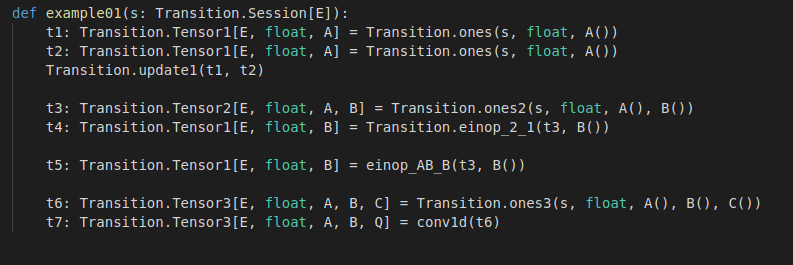Some ways to check tensor size in Python IDE
Nota bene: this is only a proof of concept at this stage.
If you ever try to play around with one of the tensorflow, pytorch/libtorch you will without any doubt find tracking tensor dimensions a pain in the… neck.
It happens that with a little typing a certain number of checks can on principle be automated.
I expose in this post a proof of concept for python/mypy using type annotations.
In future posts I intend to show some similar examples with C++ & Ocaml, the methodology applied for Ocaml being on principle applicable given HList-like types (lists of hetereogeneous typed elements). Please note, these do not require ‘macro metaprogramming’ per se - ok, C++ templates but they are used in a straightforward way. So, the interesting point of the proposed approach is to limit macro/multi-stage compilation usage as much as possible, thus making future debugging… possible/endurable! ;-)
Today, let us focus on the Python case.
The trick of the matter is to encode dimensions as a abstract type parameters. Writing code in such a generic way will on principle, later allow to add an extra optimization loop for metaparameter tuning, ‘for free’ : get a model which is as big as needed but not much more, hence allowing for faster inference and re-training. The important nuance here is that model instanciation would always work as tensor dimensions are validated automatically.
Let us first define (abstract) dimensions: A,B,C,D.
class A:
def __repr__(self) -> str:
return "A"
class B:
def __repr__(self) -> str:
return "B"
class C:
def __repr__(self) -> str:
return "C"
class D:
def __repr__(self) -> str:
return "D"So that some tensor can be declared as being of size $ A \times B $.
t3: Transition.Tensor2[E, float, A, B]
= Transition.ones2(s, float, A(), B())The core trick/cheat here is allow for dimensions check to happen almost at compile/lint check before actually running the tensor code. In Python, one way to do it is to have check-only code in the file toplevel while code itself is in a $ def() $ block. Here, transition is the name of the proof of concept package we are building…
import Transition
[...]
ctx: Transition.Context = Transition.Context()
[...]
conv1d : Callable[[Transition.Tensor3[E,float, A,B, C]],
Transition.Tensor3[E,float, A, B, Q]]
= Transition.conv1d_(Q(),
float, ctx, C(), B(), B(),
Transition._4(),
Transition._3(),
Transition._3(),
Transition._3(),
Transition._3())
def example01(s: Transition.Session[E]):
[...]
t6: Transition.Tensor3[E, float, A, B, C]
= Transition.ones3(s, float, A(), B(), C())
t7: Transition.Tensor3[E, float, A, B, Q] = conv1d(t6)Then, when running the source file…

What this output mean, is for the model to work fine, we need to make sure $ (A,B) $ contains $ B $ and that $ Q $ is equal to some formula involving $ C $. (I am sure this version is wrong but this is not the point of this post).
The second line of output, in particular, is triggered by
conv1d : Callable[[Transition.Tensor3[E,float, A,B, C]],
Transition.Tensor3[E,float, A, B, Q]]
= Transition.conv1d_(Q(),
float, ctx, C(), B(), B(),
Transition._4(),
Transition._3(),
Transition._3(),
Transition._3(),
Transition._3()) So that $ Q $ is an alias for the dimension of a particular convolution operation output.
A production version would typically check these with an SMT Solver.
Eventually, this means that we can get the IDE (say, VS Code) to point out most dimension errors via standard type checking. Nota: for some reason this seems to work with Mypy but not with pyre-check. If you have suggestions, comments about this particular ‘problem’ please do not hesitate to contact me at renoir42 at yahoo.com. Code @ Python case )

Please note, when changing a dimension in an unappropriate way from the example above…

I kind of like it already! ;-)
Full IDE integration would then mean to add an automatic run of some dummy unit test to trigger SMT checks whenever necessary…
This is left as an exercise for a next time.
Code @ Python case
Next we will have a look at Ocaml (as there are Ocaml bidings to LibTorch ) and C++.